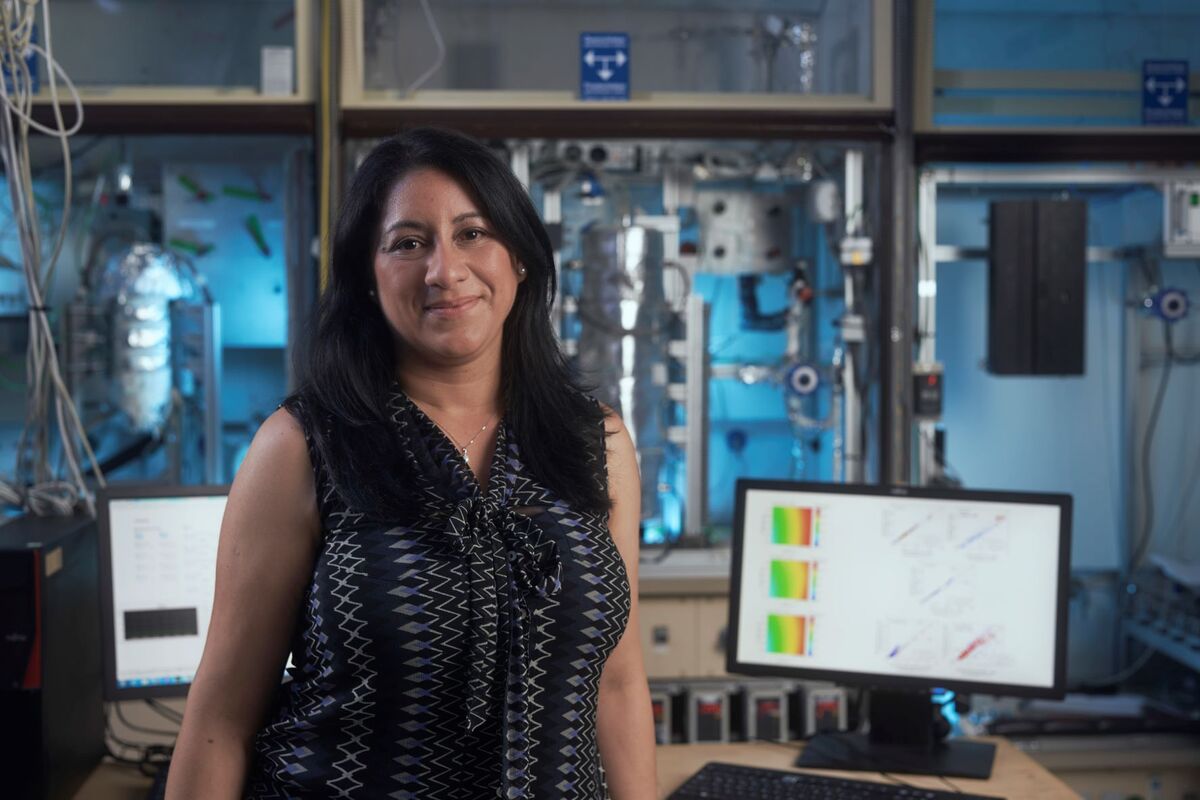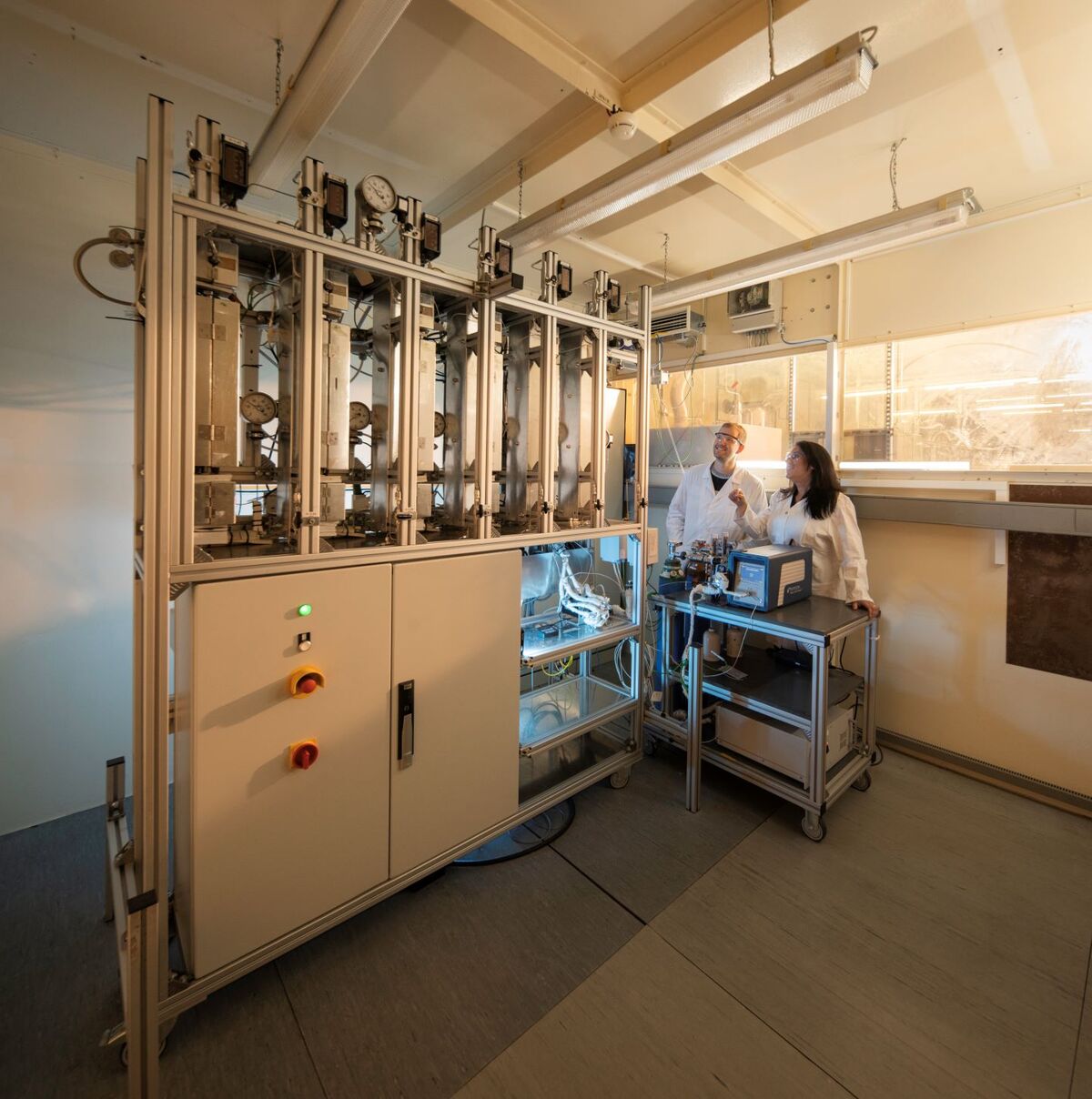Picture a Scientist - Portrait Karla Herrera Delgado
A Catalyzing Woman
When she was a child, she wanted to be a "mad scientist," says Dr. Karla Herrera Delgado. Not at all does she fit the clichés of tousled white hair and unworldliness. But she is a scientist through and through. At the Karlsruhe Institute of Technology (KIT), Karla Herrera Delgado works on chemical energy sources. Among other things, these can be used to temporarily store electricity from the fluctuating renewable sources of sun and wind when there is an oversupply, and to feed it back into the grid when needed. Such power-to-fuel concepts can be used to advance the energy transition. Since energy conversion takes place under different and not always ideal conditions, this requires process technology designed for different scales as well as robust catalysts for the individual process steps. This is the domain of Dr. Karla Herrera Delgado: Since 2017, she has been heading the synthesis gas laboratory at the KIT Institute of Catalysis Research and Technology (IKFT), and since 2018, she has been leading a team in the group "Catalysis and Processes for CO2 Fixation." She currently focuses on the conversion of CO2-rich synthesis gas into methanol and dimethyl ether (DME) and on heterogeneous catalysis, where the catalyst and reacting substances are in different states of aggregation.
Fascinated by Experimentation
Karla Herrera Delgado's daily research routine alternates between modeling on the computer and experiments in the laboratory. The latter have fascinated her since she was a child. "Mixing has always been the thing for me,” she says. The Latin American country of Costa Rica, where she was born and raised, is not only characterized by its dreamlike landscape and incredible biodiversity. Education has a high priority there; many opportunities are open to women. "If you have good grades, interest, and motivation, you can study - the gender ratio is balanced at the universities." Herrera Delgado herself chose to study chemistry at the Universidad of Costa Rica (UCR), the country's oldest and largest university. The thesis she prepared in her home country was a feasibility study for the industrial production of zeolite A, a chemical used primarily as a softening and drying agent. In 2010, she came from Costa Rica directly to Germany and to KIT: At the Institute for Chemical Technology and Polymer Chemistry (ITCP), she did her doctorate under the supervision of Professor Olaf Deutschmann. In her doctoral thesis, she dealt with nickel-based catalysts and developed a reliable microkinetic model for the application of these catalysts in an industrially relevant chemical process.
Processes Optimized Step by Step
Karla Herrera Delgado completed her doctorate in 2014. The research conducted as part of it made a decisive contribution to the success of the DRYREF project, which was funded by the German Federal Ministry for Economic Affairs and Technology and involved the companies BASF, hte, and Linde, as well as the University of Leipzig, the Technical University of Munich, and KIT. Before the project started, Karla Herrera Delgado had to fill in some time at the institute. "Back then, I just helped out in the secretariat." Pragmatism characterizes the now 40-year-old as much as humor. In IKFT's "Reactions and Materials" department headed by Professor Jörg Sauer, she currently supervises four doctoral students from different countries - Brazil, Colombia, and Germany - together with her group leader Dr. Stephan Pitter. They will soon be joined by a fifth doctoral student from Brazil. "One of my big dreams is to supervise a research group with scientists from all over the world and international collaborations."
Dr. Karla Herrera Delgado praises the family-friendly working conditions at KIT. When she became pregnant, all ongoing research projects were able to continue successfully under strict protection and safety precautions and with the active support of her scientific colleagues. Her daughter, who is meanwhile almost three years old, is cared for at the KIT daycare center. "She loves the ‘Kita‘ - the care is excellent," says Karla Herrera Delgado. Together with her husband and daughter, she lives in the Waldstadt district of Karlsruhe. "The motivation and support from my family, especially from my husband Juan Pablo, encourages me to tackle challenging new projects."
Through her research in the MTET Helmholtz program, Karla Herrera Delgado is contributing to a sustainable energy system for the future. Her research success is reflected in recent publications, in which she has played a significant role. What is her vision? The researcher points to reality: "We first look at chemical processes that are currently underway in order to develop them further with innovative approaches and make better use of existing resources - step by step. Our goal is to better integrate carbon-neutral technologies into the energy supply." So she is a scientist indeed, but not a mad one. She simply has a passion for “doing some pretty cool stuff."



